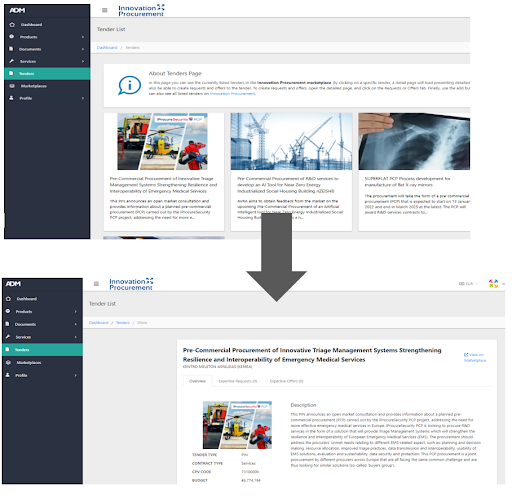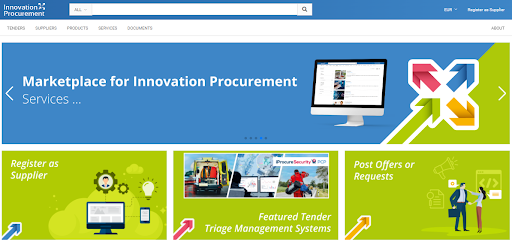 https://www.synyo.com/wp-content/uploads/SYNYO-NEWS-featured-image-NEW01007705EN.png
400
459
leo
https://www.synyo.com/wp-content/uploads/2017/09/synyo-logo.png
leo2025-01-01 10:47:112025-02-10 10:48:51BOND: Outcomes in Advancing Education, Tolerance and Heritage Preservation to combat Antisemitism
https://www.synyo.com/wp-content/uploads/SYNYO-NEWS-featured-image-NEW01007705EN.png
400
459
leo
https://www.synyo.com/wp-content/uploads/2017/09/synyo-logo.png
leo2025-01-01 10:47:112025-02-10 10:48:51BOND: Outcomes in Advancing Education, Tolerance and Heritage Preservation to combat Antisemitism
iProcureSecurity PCP: Project officially launched 6,7 mio. EUR Call for Tenders on Innovation Procurement
The iProcureSecurity PCP project focuses on the development of Triage Management Systems solutions for Emergence Medical Services and has now launched its 6,7 mio. EUR Call for Tenders, following the Pre-Commercial Procurement initiative, which fosters Research and Development of innovative technologies. It allows the Research and Development of innovative disruptive technologies to support the management of Mass Casualty Incidents.
Mass Casualty Incidents (MCI) have been known for a long time and they challenge societies, organisations and institutions. Besides pandemics, societies face natural and human-caused disasters, such as floods, earthquakes, armed conflicts, terrorist attacks or global-scale disasters. In these kinds of events, not only prevention, but also the proper management of the incident on the field can be very challenging, especially for those actors involved in the rescue, triage, treatment and decision-making processes (Emergency Medical Services). But also, a wide range of stakeholders, agencies and institutions are necessarily involved in the management of the event in order to facilitate the rescue operations and the support the casualties involved (e.g., local and national authorities, hospitals, dispatch centers, etc.).
It should be considered, that Emergency Medical Services (EMS) in Europe are characterised by a pluralistic landscape with diverse organisational setups, professional standards, coordination mechanisms and actors which result from different historical and institutional contexts in EU member states. However, diversity is united by the common aim of providing timely care to casualties of sudden and life-threatening injuries, emergencies or disasters in cross-border settings and international humanitarian missions. Fostering the response capacities and increasing the cooperation of the European EMS is of decisive importance for strengthening the resilience of European societies in the light of multiple hazards thus, calling for close cooperation of public safety and health authorities on an international level.
The vision of iProcureSecurity PCP builds the foundation for the development of novel triage management systems, that are able to overcome fundamental shortcomings of currently used systems and which will allow to digitalise key processes and thereby strongly contribute to an improved quality of the service for all involved stakeholders.
Core Research
The research developed as part of the iProcureSecurity PCP project is based on the findings collected and analysed during the iProcureSecurity CSA project and enlarged by in-depth assessments during the first months of the project.
The implemented activities aimed to first understand the gaps and shortcomings related to triage management systems as well as to pave the way for the development of innovative systems able to support the EMS in the operational management of the MCIs. The envisaged solution will enable planning and decision-making processes, taking into account all the existing variables faced by the EMS practitioners in the MCI area. Likewise, the allocation of resources will be more efficient and the cost of each intervention will be reduced, while always ensuring casualty safety. In general, all emergency professionals the project consortium engaged with, claimed that the current practices in the area of triage management need to be improved and the development that is carried out by the industry has to go beyond the current state of the art.
A system that truly has an impact on the work of the emergency teams should allow a quick, easy and uninterrupted communication and information flow among the EMS practitioners on the field, allowing them to exchange information in real time with the other stakeholders in the EMS ecosystem (e.g., information sharing with the Dispatch Centre and the hospitals). Furthermore, part of the project vision is to connect the iProcureSecurity PCP solution with and to existing and upcoming third-party solutions and databases (e.g., casualty’s medical history). The aforementioned necessity implies that the iProcureSecurity PCP Solution is able to exchange data directly with other information systems of the EMS organisations involved. The interoperability concept has to ensure that existing and upcoming third-party solutions can connect to the solution according to clearly defined standards and thereby ensure sustainability of the solution.
A system for triage management that meets the challenges faced by the EMS practitioners across Europe should be digital and able to provide data that facilitates the evaluation of interventions between different teams on national or European levels. However, to achieve this goal, the iProcureSecurity PCP Solution needs to demonstrate also the capability to be used during MCI training.
Finally, as the health data of casualties that is transferred and updated between the different actors is concerned, data protection must be guaranteed at all times and supported by putting in place all the necessary cybersecurity measures.
Methodology and Preliminary Results
In its first eight months, the iProcureSecurity PCP project has made major progress towards its goal of developing the first phase of the PCP procedure.
Requirements, use cases and process models: In order to reach the results, in-depth research and analytic activities have been carried out, based on desk-based research, literature reviews, focus groups, workshops and data collection and analysis. These activities enable the identification of more than 200 requirements; the creation of nine use cases, and ten service process models.
Call for Tenders: All the previous results paved the way for the creation of a comprehensive Call for Tenders, which has been officially launched on the 15th of June 2022, through the official channel eTED Portal and on the dedicated Innovation Procurement Platform, which allows the monitoring and submission of Tenders, as well as the showcase of products and solutions and the matchmaking with other suppliers. (More information below).
Open Market Consultation: The process has been facilitated and supported by the organisation and delivery of seven Open Market Consultation events, which enabled the first communication channels with potential suppliers and a first insights on the technologies available on the market and their level of readiness.
The research conducted within the project outlined the importance of:
- Stronger coordination and engagement of local key actors is at the core of an improved approach,
- Enhancing cooperation in Mass Casualty Incidents (MCIs), which often cross the national borders and requires an efficient and effective cooperation among countries and institutions. Thus, transnational cooperation has been identified as an essential component of properly manage MCIs,
- Lastly, innovative and disruptive technologies, which must be developed and customised to the specific needs of the actors involved, facilitating the cooperation of the field, the communication among the wide range of stakeholders involved in the MCI and supporting the decision-making process of the EMS, in order to react quickly and efficiently during the disaster.
Call for Tenders is launched
The project iProcureSecurity PCP launched the Call for Tenders, opening new opportunities for suppliers working on technological innovation applicable in emergency medical fields. To reach the scope, the quality and the efficiency of the project objectives, suppliers will have to take into account (a) the combination of innovative technologies; (b) organisation and structural component in which the solution will be embedded; (c) the integration of existing national-based systems and procedures; and (d) technical requirements and use cases which have been created within the project implementation activities.
From a technology perspective the focus area includes means to continuously capture and update triage information, the sharing of information in real time among several stakeholders and the gathering and updating of casualties’ vital parameters.
The iProcureSecurity PCP project has identified four main challenges in the triage management system:
- Triage tracking: The tracking of triage situations is currently done manually by the actors on the field. This makes it quite difficult for the stakeholders to collect the information for an initial overview, to maintain an updated vision of the situation while the latter evolves, and to connect with and update in real time the other stakeholders involved in the rescue activities.
- The iProcureSecurity PCP solution should take into consideration digitalising the existing manual system, and thus, allow to maintain a record of the triaged casualties; updating in real time the data baseline; and to share it with the relevant stakeholder.
- Data interoperability: The data interoperability between different organisations on-site is currently a challenging task, although extremely pivotal for the successful outcomes of rescues in major incidents.
- The digitalized solution provided by the project wants to provide a fully interoperable system that will be able to react and adapt to unexpected changes in the situation. This will also simplify and smooth the decision-making processes for casualty’s prioritisation and resource planning.
- Information handover: Casualties are often handed over to several stations, when major incidents occur. This also means that the casualties are monitored, checked and treated by different actors. The objective for the information handover is to be as accurate as possible, while also consuming as little time as possible for the personnel involved, which can be a challenging task if factors such as a manually written or transcribed documentation, proprietary systems and potentially semantic or taxonomic difficulties are involved.
- A distribution of digitalised triage information to any authorised data consumer is efficient, consistent and reliable and does not bind human resources of the involved organisations. It also has the inherent advantage of providing a larger amount of information than what is strictly necessary for the supported process step, which would be well beyond the scope of an efficient manual handover.
- Mutable circumstances: In a large-scale incident, the situation can evolve rapidly, involving multiple organisations, carrying out a large subset of routines involving multiple decision points. A manual documentation of these activities is challenging, as it binds valuable resources and is often carried out under stress, impacting the accuracy, thoroughness and correctness of captured information.
- The solution will provide a consistent, chronological, documentation on the triage classification, the treatment received on site, and the handover for transportation. By using consistent reference objects and adhering to standardised data formats, a comprehensive data basis is created throughout an incident, which supports the analysis of how the incident situation evolved on site, and derives insights on how to continuously improve the triage procedure from a long-term perspective
The specific technical requirements which should be taken into consideration during the development of the solution, can be found on the iProcureSecurity PCP Tender Documents on the Innovation Procurement Platform.

Innovation Procurement Platform
The iProcureSecurity PCP project developed the Innovation Procurement Platform.
The platform has been designed to provide suppliers with the option to register their organisations, showcase products and solutions – as well as additional relevant documents – and to match interests, and services with other suppliers and relevant partners.
In addition to that, and following the specifications of the iProcureSecurity PCP project, the online Marketplace for Innovation Procurement included among its features the tender submission and evaluation. The embedded system serves as a transparent, intuitive and easy-to-use evaluation process for tenders and, as such, it promotes also an unbiased selection of offers.
In its initial phase, the Marketplace has launched the Innovation Procurement Platform, which focuses – due to the project scope – mostly on the EMS (Emergency Medical Service) sector.
Following the needs and specifications of the iProcureSecurity PCP project, the Innovation Procurement Platform will serve the different organisations in:
- Matching and connecting with other suppliers
- Monitoring and checking several tenders
- Getting informed, updated and guided throughout the creation of the proposals
- Submitting Open Tender Proposals
To join the Innovation Procurement Platform, click on the following link
https://innovationprocurement.com/

References
[1] UNHCR (2019). Policy on Emergency Preparedness and response, Division of Emergency, Security and Supply, available at: https://emergency.unhcr.org/entry/124201/policy-on-emergency-preparedness-and-response
Bar On, E. (2013). Coping with the challenges of early disaster response: 24 years of field hospital experience after earthquakes, Disaster Medicine and Public Health Preparedness.
Debarre, A. (2018, December). Hard to Reach: Providing Healthcare in Armed Conflict. International Peace Institute, available at: https://reliefweb.int/sites/reliefweb.int/files/resources/1812_Hard-to-Reach.pdf
WHO & ECHO. (2020). Disaster Preparedness: A compendium of experiences, available at: https://ec.europa.eu/echo/what/humanitarian-aid/disaster-preparedness_en
iProcureSecurity PCP. Project website: https://pcp.iprocuresecurity.eu/
Keywords
Pre-Commercial Procurement, PCP, Triage Management Systems, Emergency Medical Services, Capability Gaps, Innovation Needs, Innovation Procurement, Disaster Management, Technology, Innovation.




